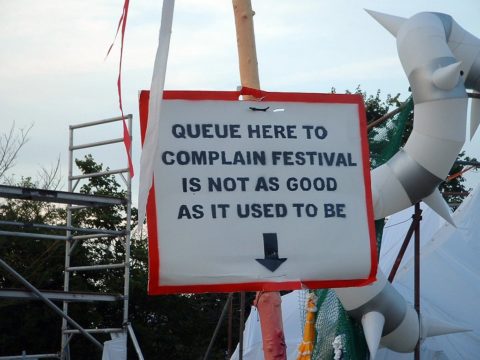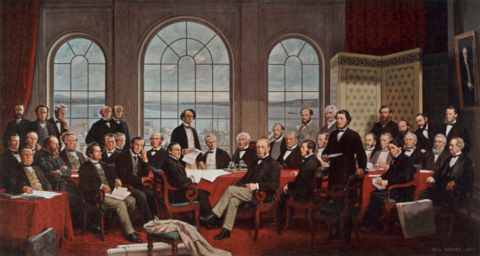Overly Sarcastic Productions
Published Mar 15, 2024Ancient Greece created a social ecosystem of numerous independent cities to cater to my tastes specifically.
SOURCES & Further Reading:
The Greeks: A Global History by Roderick Beaton, 2021
The Greeks: An Illustrated History by Diane Cline, 2016
Men of Bronze: Hoplite Warfare in Ancient Greece by Donald Kagan & Gregory F. Viggiano, 2013
“Revolution” & “Tyranny” from Ancient Greek Civilization by Jeremy McInerney
“Dark Age and Archaic Greece” from The Foundations of Western Civilization by Thomas F. X. Noble
“Dark Age and Archaic Greece” & “The Greek Way of Waging War” & “Greek Language, Literacy, and Writing” from The Greek World: A Study of History and Culture by Robert Garland
I also have a degree in Classical Studies
(more…)
July 5, 2024
History Summarized: The Greek Age of Cities
QotD: South Africa after Apartheid
Now, what has replaced this abhorrent socio-political system [apartheid] is not good, at all; indeed, what has since happened in South Africa is typical of most African countries: massive corruption, bureaucratic inertia, inefficiency and incompetence, and a level of violence which makes Chicago’s South Side akin to a holiday resort. (For those who wish to know the attribution for much of the above, I recommend reading the chapter entitled “Caliban’s Kingdoms” in Paul Johnson’s Modern Times.) Where South Africa differs from other African countries is twofold: where in the rest of Africa the preponderance of violence and oppression was Black on Black — and therefore ignored by the West — apartheid was a system of White on Black oppression (and therefore more noticeable to Western eyes). The second difference is that apartheid exacerbated the virulence of the “grievance” culture which demands reparations (financial and otherwise) for the iniquities of apartheid. This continues to unfold, to where the homicide rate for White farmers — part of the taking of farmland from Whites — is one of the highest in the world, and the capture and conviction rates for the Black murderers among the lowest — a simple inversion of the apartheid era.
Speaking with hindsight, however, it would be charitable to suggest […] that apartheid was “simply a logical adaptation to the presence of a population that simply cannot support or sustain a First World standard of living, done by people who very much valued the First World society they had created”. While that statement is undoubtedly true, up to a point, and it could be argued that apartheid was a pragmatic solution to the chaos evident throughout the rest of Africa, it cannot be used as an excuse. Indeed, such a labeling would give, and has given rise to the notion that First World systems are inherently unjust, and a different label “colonialism” — which would include apartheid — can be applied to the entirety of Western Civilization.
The fact of the matter is that when it comes to Africa, there is no good way. First World — i.e. Western European — principles only work in a socio-political milieu in which principles such as the rule of law, free trade, non-violent transfer of political power and the Enlightenment are both understood and respected. They aren’t, anywhere in Africa, except where such adherence can be worked to temporary local advantage. Remember, in the African mindset there is no long-term thinking or consideration of consequence — which is why, for example, since White government (not just South African) has disappeared in Africa, the infrastructure continues to crumble and fail because of a systemic and one might say almost genetic indifference to its maintenance. When a government is faced with a population of which 90% is living in dire poverty and in imminent danger of starvation, that government must try to address that first, or face the prospect of violent revolution. It’s not an excusable policy, but it is understandable.
That said, there is no gain in rethinking apartheid’s malevolence […] because apartheid was never going to last anyway, and its malevolence was bound to engender a similar counter-malevolence once it disappeared. Which is the main point to my thinking on Africa: nothing works. Africa is simply a train-smash continent, where good intentions come to nought, where successful systems and ideas fail eventually, and where unsuccessful systems (e.g. Marxism) also fail, just fail more quickly.
Kim du Toit, “Tough Question, Simple Answer”, Splendid Isolation, 2019-12-05.
July 4, 2024
“In other words, God is a deliverable for the R&D team”
Ted Gioia isn’t impressed with the changes we’ve seen over the years among the Silicon Valley leadership:
Yes, I should have been alarmed when this cult-ish ideology took off in Silicon Valley — where the goal had previously been incremental progress (Moore’s law and all that) and not being evil.
When I first came to Silicon Valley at age 17, the two leading technologists in the region were named William Hewlett and David Packard. They used their extra cash to fund schools, museums, and hospitals — both my children were born at the Lucile Packard Children’s Hospital — not immortality machines, or rockets to Mars, or a dystopian Internet of brains, or worshipping at the Church of the Singularity.
Tech leaders were built differently back then. When famous historian Arnold Toynbee visited Stanford in 1963, he had a chance encounter with William Hewlett. Afterwards Toynbee marveled over his new acquaintance, declaring: “What an amazing fellow. He has more knowledge of history than many historians.”
In other words, Bill Hewlett had more wisdom than ego. He invested in the community where he lived — not the Red Planet. Instead of promulgating social engineering schemes, Hewlett and Packard built a new engineering school at their alma mater, and named it after their favorite teacher.
They wouldn’t recognize Silicon Valley today. The FM-2030s are now in charge.
Another warning sign came when Google hired cult-ish tech guru Ray Kurzweil — a man who had once created a reasonable music keyboard that even Stevie Wonder used.
But Kurzweil went on to write starry-eyed books of utopian tech worship which come straight out of the weird religion playbook (The Age of Spiritual Machines, The Singularity is Near, etc.)
What does tech look like when it gets turned into a religion? Kurzweil summed it up when asked if there is a God. His response: “Not yet.”
In other words, God is a deliverable for the R&D team.
I note that, when Forbes revisited Ray Kurzweil’s predictions, they found that almost every one went wrong.
So what does he do?
Kurzweil follows up his book The Singularity is Near with a new book entitled The Singularity is Nearer. Give the man credit for hubris. This is exactly what religious cults do when their predicted Rapture doesn’t occur.
They just change the date on the calendar — Utopia has been delayed for another 12 months.
But, of course, Utopia is always delayed another 12 months. Meanwhile the cult leaders can do a lot of damage while preparing for the Rapture.
And despite the techno-elite’s apparent endless quest for perfection in their own lives, the enshittification of the technology they deliver to us proles continues relentlessly:
Here’s a curious fact. The more they brag about their utopias, the worse their products and services get.
Even the word upgrade is now a joke — whenever a tech company promises it, you can bet it will be a downgrade in your experience. That’s not just my view, but overwhelmingly supported by survey respondents.
For the first time since the dawn of the Renaissance, innovation is now feared by the vast majority of people. And the tech leaders, once admired and emulated, now rank among the least trustworthy people in the world.
It was different when Linus Pauling was peddling his horse pills — he eventually set up shop in Big Sur, far south of the tech industry, in order to find a hospitable home for his wackiest ideas.
Nowadays, Big Sur thinking has come to the Valley.
And when you set up cults inside the largest corporations in the history of the world, we are all endangered.
Just imagine if Linus Pauling had enjoyed the power to force everybody to take his huge vitamin doses. Just imagine if Bill Shockley had possessed the authority to impose his racist eugenics theories on the populace.
It’s scary to think of. But they couldn’t do it, because they didn’t have billions of dollars, and run trillion-dollar companies with politicians at their beck and call.
But the current cultists include the wealthiest people in the world, and they are absolutely using their immense power to set rules for the rest of us. If you rely on Apple or Google or some other huge web behemoth — and who doesn’t? — you can’t avoid this constant, bullying manipulation.
The cult is in charge. And it’s like we’re all locked into an EST training sessions — nobody gets to leave even for bathroom breaks.
There’s now overwhelming evidence of how destructive the new tech can be. Just look at the metrics. The more people are plugged in, the higher are their rates of depression, suicidal tendencies, self-harm, mental illness, and other alarming indicators.
If this is what the tech cults have already delivered, do we really want to give them another 12 months? Do you really want to wait until they deliver the Rapture?
“Over twenty years ago now, we declared war on terror; a generation later, we are ruled by terror”
At Postcards From Barsoom, John Carter discusses the prevalence of fear in modern western culture:
Over twenty years ago now, we declared war on terror; a generation later, we are ruled by terror. The public discourse revolves around peoples’ fears, most of them imagined. Many spend their lives petrified at the prospect of normal social interaction. Women are scared that men will rape them, and men are scared that women will rape them in the courts. Both leftists and rightists are terrified that the other, if given free rein, will drag the world into a dark age, though only one of them is right. All of our great public efforts are either to mitigate this future catastrophe or that dire present threat, or they are about furiously not acknowledging some insoluble and therefore inevitable future disaster, while studiously ignoring some entirely soluble ongoing emergency which those who could solve delude themselves they can profit from.
It shouldn’t be surprising that the war on terror ended up making us chronically terrified. That’s the track record for these things. Even back in the 1990s we knew that. The war on poverty generated an obscenely inflated welfare underclass while systematically slowing economic growth, thereby generating poverty twice over. The war on drugs led to a society of drug addicts, in which every fifth person is on at least one kind of pill, and most of the rest are self-medicating in other ways. Instead of weed (legal now, in any case), we have fentanyl and meth. Victory!
When Washington declares war on something, it invariably produces more of it. This seems perverse until you realize that wars on abstractions are simply how managerial bureaucracies extend their bases of power. A war that can never be won is a war with job security. A war that gets worse the longer and harder you fight it is even better, because this generates growth.
Washington’s current wars seem to be on racism, baseline human sexual normalcy, men, and multipolarity; the latter is really just a fancy word for the growing tendency for other countries to not do what Washington tells them to because, in general, they prefer being racist to being erased, they think the butt stuff is weird, they don’t want to be castrated, and since they are not castrated, they are still capable of not liking to be told what to do. Sure enough, all of these wars, whether cultural or geopolitical, are steadily generating the very things that they’re trying to stamp out. Racism stocks have reached prices they haven’t seen in generations, thanks to sustained decade of all-out full sector push by the media, corporate, educational, and public sectors, all doing their part to push that line up, up, up. Meanwhile, the war on multipolarity seems in general to be doing a fantastic job of generating more multipolarity.
The longer Washington wages its cowardly war against Russia, China, Iran, and I guess now North Korea, the more Washington’s standing in the world is reduced. I say “cowardly” of course because the war is not waged openly: formally, no war has been declared by Washington or any of its core NATO allies against any of the obvious belligerents. It’s all done through proxies which Washington pays to train and arm and die on its behalf, funding it all with a money printer whose brrrring has gotten defeaning. Or it’s done through sabotage; let’s not forget Nordstream, which kicked the legs out from under Germany’s, and therefore Europe’s economy, in perhaps the most breathtakingly cynical act of strategic sabotage against a supposed ally that one might imagine. Washington doomed Europe in order to ensure that Europe would stay attached to Washington. The whole world sees what Washington is doing of course, and is frightened lest it happen to them, but also disgusted that it happens at all; the latter emotion is becoming increasingly dominant, however, because Washington is becoming less frightening every day.
Washington could not even coordinate an orderly retreat from Afghanistan; its wunderwaffen have made little impact on the Ukrainian battlefront; even combined with its vassals, it cannot match levels of armament production that come effortlessly to its adversaries; its pier in Gaza fell apart uselessly; its mighty navy has so far been utterly powerless to stop a blockade imposed by some obscure tribe of desert Arabs. Then there’s the big fail, Washington’s attempt to nuke the Russian economy by locking it out of the SWIFT system. The Russian economy is doing fine, in fact better than fine, but SWIFT on the other hand is swiftly becoming irrelevant. The dollar’s global reserve status is on borrowed time, and everyone knows it.
I don’t think anyone’s more terrified right now than Western elites. They know they’ve fumbled the ball, that they’ve lost their footing, and they’re flailing around weightlessly as they try to catch it without faceplanting. None of their plans are really working. None of their usual levers of control are as effective as they used to be; some, such as the media, have almost stopped responding altogether. Their people are turning against them for a dozen different reasons, all of them excellent. Their great economic machine is sluggish, its components grinding together and seizing up. Their enemies abroad are on the march, or mobilizing. It’s all coming for them at once, and they don’t appear to have any idea what to do. You’re seeing that deer in the headlights look a lot now from prime ministers and presidents, and it isn’t always because of dementia. They’re in over their heads. Children, playing a game that became all too real when they weren’t paying attention.
Argentina’s inflation rate
As you may have noticed, my interest in Argentinian affairs increased a lot with the election of Javier Milei as President. His first six months in office, while turbulent, do seem to have the economic indicators moving in the right direction for ordinary Argentines:
Argentina’s inflation rate has recently dropped to its lowest point since January 2022, registering a monthly increase of 4.2 percent in May according to the National Institute of Statistics and Census (INDEC). Although annual inflation has slowed for the first time since mid-2023, it still stands at 276.4 percent, one of the highest rates globally.
When Javier Milei assumed the presidency in December 2023, monthly inflation had skyrocketed to an unprecedented 25.5 percent. Within five months, Milei’s administration managed to reduce this figure by more than 20 percentage points. Despite the persistently high annual inflation rate, the trend indicates potential stabilization of the Argentine economy.
Javier Milei’s reforms have been described as aggressive. In his inaugural speech, he emphasized the need to clean up the economy before implementing his promises to dollarize and close the central bank.
To achieve a zero deficit, Milei enacted a 35 percent reduction in public spending. He achieved this by closing half of the ministries and secretariats, suspending public works for a year, reducing subsidies for energy and transportation, canceling government advertising, and maintaining the 2023 budget for 2024 despite an inflation rate of 300 percent. Essentially, the government drastically cut its expenditures.
These measures, although unpopular, yielded results. Milei’s government not only avoided a deficit, but achieved a surplus, and most importantly, inflation began to decline.
Following the inflation story in Argentina recently brought to mind Henry Hazlitt’s famous 1978 article “Inflation in One Page“. As the title suggests, Hazlitt summarizes the causes and remedies of inflation in a brief and simple explanation. He argued that inflation is a consequence of government monetary policies, specifically excessive money printing due to unbalanced budgets caused by extravagant government spending.
How the First Tanks CONQUERED the Trenches
The Tank Museum
Published Mar 16, 2024This is the story of the evolution of the tank during World War One. Notorious for its appalling human cost, the First World War was fought using the latest technology – and the tank was invented to overcome the brutally unique conditions of this conflict.
Arriving at the mid-point of the war, they would be built and used by the British Commonwealth, French and German armies – with the US Army using both British and French designs.
00:00 | Intro
01:17 | The Beginnings of WWI
02:13 | The Solution to Trench Warfare
03:47 | Initial Ideas
05:42 | How to Cross a Trench
08:08 | How Effective was the Tank?
15:40 | Battlefield Upgrades
17:09 | New Designs
24:32 | ConclusionThis video features archive footage courtesy of British Pathé.
#tankmuseum #evolution #tank #tanks #ww1 #technology
QotD: “The Battle Hymn of the Republic”
Memorial Day in America – or, if you’re a real old-timer, Decoration Day, a day for decorating the graves of the Civil War dead. The songs many of those soldiers marched to are still known today – “The Yellow Rose Of Texas”, “When Johnny Comes Marching Home”, “Dixie”. But this one belongs in a category all its own:
Mine eyes have seen the glory of the coming of the Lord
He is trampling out the vintage where the grapes of wrath are stored…In 1861, the United States had nothing that was recognized as a national anthem, and, given that they were now at war, it was thought they ought to find one – a song “that would inspire Americans to patriotism and military ardor”. A 13-member committee was appointed and on May 17th they invited submissions of appropriate anthems, the eventual winner to receive $500, or medal of equal value. By the end of July, they had a thousand submissions, including some from Europe, but nothing with what they felt was real feeling. It’s hard to write a patriotic song to order.
At the time, Dr Samuel Howe was working with the Sanitary Commission of the Department of War, and one fall day he and Mrs Howe were taken to a camp a few miles from Washington for a review of General McClellan’s Army of the Potomac. That day, for the first time in her life, Julia Ward Howe heard soldiers singing:
John Brown’s body lies a-mould’ring in the grave
John Brown’s body lies a-mould’ring in the grave…Ah, yes. The famous song about the famous abolitionist hanged in 1859 in Charlestown, Virginia before a crowd including Robert E. Lee, Stonewall Jackson and John Wilkes Booth.
Well, no, not exactly. “By a strange quirk of history,” wrote Irwin Silber, the great musicologist of Civil War folk songs, “‘John Brown’s Body’ was not composed originally about the fiery Abolitionist at all. The namesake for the song, it turns out, was Sergeant John Brown, a Scotsman, a member of the Second Battalion, Boston Light Infantry Volunteer Militia.” This group enlisted with the Twelfth Massachusetts Regiment and formed a glee club at Fort Warren in Boston. Brown was second tenor, and the subject of a lot of good-natured joshing, including a song about him mould’ring in his grave, which at that time had just one verse, plus chorus:
Glory, glory, hallelujah
Glory, glory, hallelujah…They called it “The John Brown Song”. On July 18th 1861, at a regimental march past the Old State House in Boston, the boys sang the song and the crowd assumed, reasonably enough, that it was inspired by the life of John Brown the Kansas abolitionist, not John Brown the Scots tenor. Over the years in the “SteynOnline Song of the Week”, we’ve discussed lyrics featuring real people. But, as far as I know, this is the only song about a real person in which posterity has mistaken it for a song about a completely different person: “John Brown’s Body” is about some other fellow’s body, not John Brown the somebody but John Brown the comparative nobody. Later on, various other verses were written about the famous John Brown and the original John Brown found his comrades’ musical tribute to him gradually annexed by the other guy.
Mark Steyn, “The Battle Hymn of the Republic”, Steyn Online, 2019-05-26.
July 3, 2024
The Korean War Week 002 – The Fall of Seoul – July 2, 1950
The Korean War by Indy Neidell
Published 2 Jul 2024The North Korean forces are advancing all over, and this week they take Seoul, the South’s capital city, after just a few days of the war. There is another tragedy for the South when the Han River Bridge is blown while thousands of people are crossing it, resulting in hundreds of civilian deaths. The world responds to the invasion — condemning it everywhere, and the Americans decide to send in ground forces to help the South.
(more…)
The profound, utter, inescapable uselessness of the legacy media
As an early and enthusiastic blog reader and eventually a blog creator, I’ve always sought interesting aspects of stories in the news — even when I disagreed with the source or the presentation, it’s always a good thing to approach any topic “in the round” whenever possible. Getting all your information from one viewpoint or even one source is a good way to gaslight yourself. Once upon a time, while the TV networks tended to be as bland as they could (because going too far toward sensationalism would be a good way to get in bad with the regulators who control your broadcasting privileges), newspapers were not under such strong moderation. You could find very progressive, mildly progressive, centrist, and even mildly conservative voices with relative ease. At least, that’s what a rosy view of media history suggests — I think you have to go back before World War II to find really vigorous debates among the major newspapers.
Here in Canada, the mass media were already overly deferential to the government of the day — unless it was a Conservative government, of course — and after the internet and social media ate all the profit out of their business, they turned as one to the government to bail them out. In return, they became even more deferential to official story lines unless the foreign press forced their collective hand to present a more complete story. Over the last few years, as the surviving mainstream media shed jobs, many journalists have “crossed the lines” and become much more like their distant predecessors in the media: diggers of dirt, tellers of uncomfortable truths, and impartial mockers of government incompetence (Canada’s The Line is an excellent example of this … even when I don’t link to them, I almost always find their articles interesting and informative.)
All that throat-clearing out of the way, here’s Chris Bray asking what you have learned from the mainstream media lately:
When was the last time you read something in the mainstream news media — an op-ed piece, a major revelation that some clever and persistent investigative reporter dug up, a sharp bit of news analysis — that surprised you? When was the last time you read something in the news that changed your understanding of a major issue? When was the last time something in the “news” reframed an issue in your head with an argument you hadn’t anticipated, or with new evidence that you hadn’t heard before? “Man, I’d never thought of it that way,” you say, tossing the New York Times down on the coffee table.
Related, when was the last time a report or a panel discussion on television news surprised you and made you see something differently?
My impression is that the public sphere is now made up almost entirely of people saying things that we already know they’re going to say. “Jennifer Rubin will now analyze the presidential debate.” You don’t need to hear that. There’s no need to listen to any of it, ever. Andrea Mitchell is for [current thing]. Of course she is. If you know what [current thing] is, what’s the point of an Andrea Mitchell?
It’s all so dull.
There are at least a couple hundred prominent media and academic figures in the United States who could die tonight without anyone noticing, as long as there was a tape or a computer program of some kind to go on posting the received wisdom of the day under their names.
Tanks! – Allied tanks of WW2 – Sabaton History 127
Sabaton History
Published Mar 14, 2024Sabaton has written several songs about tanks — the boys are tank CRAZY! Songs like “Ghost Division” or “Panzerkampf” are about the German panzers and even the Soviet ones, but what about those of the Western Allies? Were they any good? And if so, how did they lose the Battle of France?
(more…)
July 2, 2024
The virtue-signalling Olympics … aka “Glastonbury”
In Spiked, Brendan O’Neill documents the awesomely awful human beings at the Glastonbury music festival this year (like most years):

“Sign of the times @ Glastonbury Festival” by timparkinson is licensed under CC BY 2.0 .
Virtue-signalling reached its nadir on Friday night. It was at the Glastonbury music festival. Of course it was. A swaying crowd of the time-rich, turbo-smug thirtysomethings who make up Glasto’s clientele passed around an inflatable dinghy filled with dummies designed to look like migrants crossing the English Channel. As some band you’ve never heard of sang a song about “beautiful immigrants”, the audience hoisted the blow-up boat above their heads and basically crowd-surfed it. What a gauche display of phoney virtue. What an orgy of hollow vanity. Surely it would have been cheaper to rustle up a banner saying, “Aren’t we fucking wonderful?”.
It will surprise not a living soul that the boat was the handiwork of Banksy, every posh twat’s favourite graffiti artist. Banksy has never once seen a moneyed, mostly white audience that he didn’t want to titillate with platitudes about Tory scum and cruel capitalism, so it was only natural he would gravitate towards Glastonbury. He knows it’s rammed with people called Archie and Poppy who lap up his unsubtle stencils about the rat race that is neoliberal society and how dreadfully frightful war can be. So who better to dragoon into his boat stunt than these folk who likewise love advertising to the world how much they care about migrants and stuff?
Let’s leave to one side how unbelievably crude it is for a rich graffitist and Brits who can afford to fork out £355 to listen to crap music for five days to celebrate boat journeys that often end in death. One wonders if any of the audience members who cheered illegal immigration later retired to one of Glasto’s luxury yurts, which contain not only “proper flushing toilets” but also toilet attendants. You can hire one for £5,000, which, ironically, is around the same amount of money dirt-poor migrants are forced to stump up to criminal gangs for a seat on one of their perilous crossings that the righteous of Glasto think it’s a hoot to sanctify.
No, even worse than the sight of the well-off of Worthy Farm using the wretched of the Earth to burnish their moral credentials is the fact that if any Channel-crossing migrant were to rock up to Glastonbury they’d be cuffed and shoved in the back of a paddy wagon faster than you could say “What time’s Dua Lipa on?”. Glastonbury is one of the most fortified zones in Britain. It is surrounded by a fence that is 4.12m high and 7.8km long and which has numerous “unique high-security features”, including an “external roadway to prevent tunnelling”, a “45-degree overhang to prevent climbing” and “zero nuts and bolts to stop the fence being tampered with”. “No borders!”, cry the virtuous of Glasto while surrounded by a border fence that the screws of Alcatraz would have envied.
The Chevron decision
On his substack, Glenn “Instapundit” Reynolds discusses the recent US Supreme Court decision on “Chevron deference” and how it is going to impact the administrative state (and their business victims) going forward:
Goodbye, Chevron deference. Larry Tribe is already mourning the Supreme Court’s overturning of NRDC v. Chevron, in the Loper Bright and Relentless cases, as a national catastrophe:
Oh, the humanity!
Well, speaking as a professor of Administrative Law, I think I’ll bear up just fine. I’ve spent the last several years telling my students that Chevron was likely to be reversed soon, and I’m capable of revising my syllabus without too much trauma. It’s on a word processor, you know. As for those academics who have built their careers around the intricacies of Chevron deference, well, now they’ll be able to write about what comes next. And if they’re not up to that task, then it was a bad idea to build a career around a single Supreme Court doctrine.
And that wasn’t the only important Supreme Court decision targeting the administrative state, a situation that has pundit Norm Ornstein, predictable voice of the ruling class’s least thoughtful and most reflexive cohort, making Larry Tribe sound calm.
Sure, Norm, whatever you say.
But how about let’s look at what the Court actually did in Chevron, and in the Loper Bright and Relentless cases that overturned it, and in SEC v Jarkesy, where the Court held that agencies can’t replace trial by jury with their own administrative procedures, and in Garland. v. Cargill, where the Court held that agencies can’t rewrite statutes via their own regulations. I don’t think you’ll find the sort of Russian style power grab that Ornstein describes, but rather a return to constitutional government of the sort that he ought to favor.
At root, Chevron v. Natural Resources Defense Council is about deference. Deference is a partial abdication of decisionmaking in favor of someone else. So, for example, when we go out to dinner, I often order what my son-in-law orders, even if something else on the menu sounds appealing. I’ve learned that somehow he always seems to pick the best thing.
Deference doesn’t mean “I’ve heard your argument and I’m persuaded by it”, (though something like that is misleadingly called “Skidmore deference”, but isn’t actually deference at all). Deference means “even if I would have decided this question differently, I’m going to go with your judgment instead”.
Under Chevron deference, when an agency interprets a statute it administers (e.g., the EPA and the Clean Air Act), a court will uphold its interpretation so long as it is (generously assessed) a reasonable one, even if it is not the interpretation the court would have come up with on its own. As you might imagine, this, at least potentially, gives agencies a lot more leeway, particularly when, as is often the case, Congress has drafted the statute ambiguously.
With Chevron overturned, courts will now apply their own judgment instead of deferring to agencies. Of course, this isn’t as big a deal as Larry and Norm seem to think, because Chevron has been dying the death of a thousand cuts for a while. Under the “major questions doctrine”, courts already decline to defer to agency interpretations where the issue has major social or economic ramifications.
They Don’t Make Them Like ⚔️This⚔️ Any More …
Jill Bearup
Published Mar 18, 2024Ah, The Mark of Zorro. You will be endlessly told as a stage combatant that this is one to watch. There’s a reason for that, friends.
This video is sponsored by ME: https://books2read.com/juststabmenow










